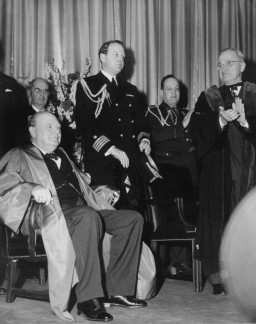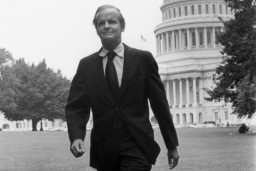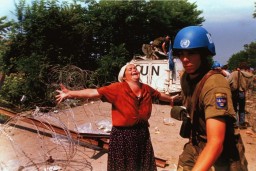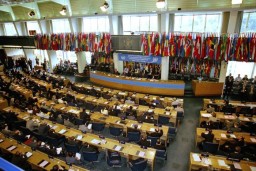March 05, 1946
Churchill’s “Iron Curtain” Speech
Winston Churchill describes the divisions emerging between the Allies in the postwar era.

After 1945
![Mourners and local residents shovel dirt into the mass grave of the victims of the Kielce pogrom during the public burial. [LCID: 14390]](/images/small/9ff2f72b-2a06-4b23-919e-7afc5ec9671c.jpg)
Mourners and local residents shovel dirt into the mass grave of the victims of the Kielce pogrom during the public burial.
—US Holocaust Memorial Museum, courtesy of Leah LahavAs Allied troops drove German troops towards defeat, they uncovered Nazi camps and massive evidence of Nazi crimes. The war had uprooted millions who were now “displaced persons” (DPs) waiting for repatriation to their home countries. For tens of thousands of Holocaust survivors, the choices were limited and daunting. Allied occupation forces faced enormous responsibilities: housing and feeding DPs, denazifying and democratizing Germany, and bringing those responsible for Nazi crimes to justice. This section also addresses genocides that have occurred since the Holocaust.
March 05, 1946
Churchill’s “Iron Curtain” Speech
Winston Churchill describes the divisions emerging between the Allies in the postwar era.

July 04, 1946
Kielce Pogrom
Massacre of Jews in the southeastern Polish town of Kielce.
![Mourners and local residents shovel dirt into the mass grave of the victims of the Kielce pogrom during the public burial. [LCID: 14390]](/images/small/9ff2f72b-2a06-4b23-919e-7afc5ec9671c.jpg)
October 01, 1946
Nuremberg Trial Verdicts
Verdicts delivered for major Nazi German leaders tried by the IMT.
![An armored car parked outside the gate of the Palace of Justice in Nuremberg on the day the judgement of the International Military ... [LCID: 94550]](/images/small/2f1cb77a-3d12-4db2-ab17-89573f72d614.jpeg)
June 25, 1948
Displaced Persons Act
The United States Congress passes the Displaced Persons Act.
![The S.S. General Black, arriving in New York harbor, brings 1,516 new immigrants to the United States under provisions of the newly ... [LCID: 91562]](/images/small/16dd7a8f-f363-4e92-ade9-b3f2cccf4126.jpeg)
January 12, 1951
UN Convention on the Prevention and Punishment of Genocide
Raphael Lemkin was a critical force for bringing “genocide” before the nascent United Nations.
![Raphael Lemkin (right) with Ambassador Amado of Brazil (left) before a plenary session of the General Assembly at which the Convention ... [LCID: lemkin1]](/images/small/38c2919b-89d7-4b02-a7d2-b71d8b21d70b.jpg)
August 28, 1959
Raphael Lemkin Dies
Raphael Lemkin coined the word "genocide" in his 1944 book, Axis Rule in Occupied Europe.
![Raphael Lemkin prepares for a talk on UN radio, probably between 1947 and 1951. [LCID: 2449480]](/images/small/5f18b280-6877-4bc1-bc88-d9226c476165.jpg)
December 15, 1961
Adolf Eichmann Found Guilty
Adolf Eichmann is found guilty of crimes against the Jewish people.
![The prosecution team, including chief prosecutor and attorney general Gideon Hausner (bottom left), during Adolf Eichmann's trial. [LCID: 65273]](/images/small/d5e30cd4-f7e6-468d-ae0d-ea5222dec315.jpeg)
November 05, 1988
US Ratifies Genocide Convention
The United States ratifies the UN Convention on the Prevention and Punishment of Genocide.

April 22, 1993
Opening of US Holocaust Memorial Museum
Dedication ceremony for the US Holocaust Memorial Museum takes place.
![A large crowd fills Eisenhower Plaza during the dedication ceremony of the United States Holocaust Memorial Museum. [LCID: n0627023]](/images/small/a7907083-ddec-423c-816b-a8f15e21c273.jpg)
May 25, 1993
UN Security Council Creates ICTY
In 1993, in response to massive atrocities in Croatia and Bosnia-Herzegovina, the United Nations Security Council created the International Criminal Tribunal for the Former Yugoslavia (ICTY).
April 06, 1994
Rwandan Genocide Begins
The conflict restarted on April 6, 1994, when a plane carrying Rwandan President Juvenal Habyarimana, a Hutu, was shot down.

November 08, 1994
ICT for Rwanda Established
On November 8, 1994, the United Nations established the International Criminal Tribunal for Rwanda (ICTR) in Arusha, Tanzania.
![Offices of the International Criminal Tribunal for Rwanda (ICTR) in Arusha, Tanzania. [LCID: geno01]](/images/small/4ca2bf69-3243-463d-b30c-3b630800624d.jpg)
July 11, 1995
Srebrenica Massacre Begins
The largest massacre in Europe since the Holocaust begins at Srebrenica.

November 21, 1995
Dayton Peace Agreement Reached
The three-year civil war in Bosnia-Herzegovina ended in 1995 with a peace agreement negotiated in Dayton, Ohio.
July 17, 1998
International Criminal Court
The Rome Statute establishes the International Criminal Court.

September 02, 1998
First Conviction for Genocide
Jean-Paul Akayesu is judged guilty of genocide and crimes against humanity.
![Offices of the International Criminal Tribunal for Rwanda (ICTR) in Arusha, Tanzania. [LCID: geno01]](/images/small/4ca2bf69-3243-463d-b30c-3b630800624d.jpg)
We would like to thank Crown Family Philanthropies, Abe and Ida Cooper Foundation, the Claims Conference, EVZ, and BMF for supporting the ongoing work to create content and resources for the Holocaust Encyclopedia. View the list of donor acknowledgement.